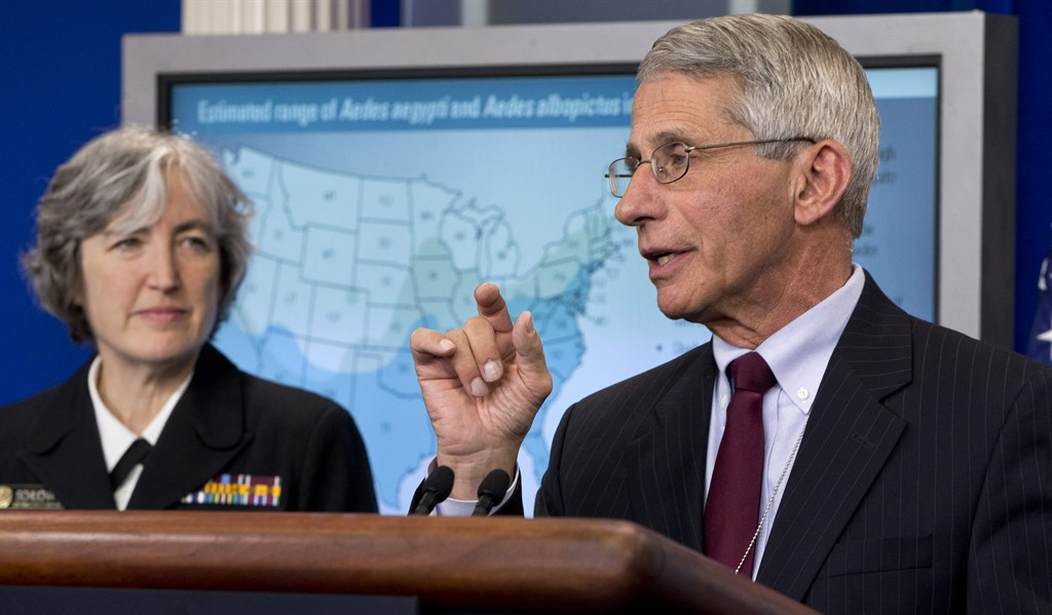There is a public health crisis in America and it’s not the pandemic. The public health crisis in the U.S. is a lack of faith in the credibility of public health experts and officials whose double standards, misinformation, and selective adherence to certain “facts” have caused widespread confusion, resentment, and fright in millions of people.
This should have been a time for the CDC, the NIH, and especially, Dr. Anthony Fauci’s National Institute of Allergy and Infectious Diseases to step up and shine. But politics and a spectacularly inept public outreach program that should have calmed fears and explained what was happening failed the American people in their most trying time.
Many will point to polls on subjects like vaccine hesitancy or the efficacy of masks and conclude the opposition comes from knuckle-dragging Trump supporters. Even if that were true — and it isn’t — how would they explain the overwhelming mistrust of public health officials by doctors, nurses and other health care professionals?
“Trust in the CDC and FDA has decreased dramatically during the COVID-19 pandemic among health care professionals,” WebMD/Medscape noted in June. “Out of nearly 2,000 U.S. nurses surveyed on Medscape (WebMD’s sister site for health care professionals) between May 25 and June 3, 77% said their trust in the CDC has decreased since the start of the pandemic, and 51% said their trust in the FDA has decreased. Similarly, out of nearly 450 U.S. doctors surveyed in the same time period, 77% said their trust in the CDC has decreased and 48% said their trust in the FDA has decreased.”
We’ve taken to lionizing doctors, nurses, and other “front line” health care workers. Indeed, especially early in the pandemic when no one knew much about COVID-19 or the coronavirus, the raw courage it took for doctors and nurses to treat sick people was truly remarkable.
Many paid for that courage with their lives.
But public health authorities have let these health care professionals down.
Respondents to the WebMD/Medscape poll cited concerns about politics affecting public health decisions as well as contradictory messaging about masks, vaccination, and proper conduct to avoid infection. Both of those concerns were on display last year when public health officials went from condemning anti-lockdown protests to promoting protests against police brutality and racial injustice.
It was incredible to watch grown-up, highly educated people who supported lockdowns and other pandemic measures struggle to articulate why, when it came to George Floyd protests, their positions changed.
“I certainly condemned the anti-lockdown protests at the time, and I’m not condemning the protests now, and I struggle with that,” Catherine Troisi, an epidemiologist at the University of Texas Health Science Center, conceded to the Times. “I have a hard time articulating why that is OK.”
“It’s one thing to protest what day nail salons are opening, and it’s another to come out in peaceful protest, overwhelmingly, about somebody who was murdered right before our eyes,” New Jersey Gov. Phil Murphy huffed in an open assertion that only protests with which he agreed were acceptable.
Public health officials were silent about this double standard, or actively approved of it, further eroding trust in their judgments. If it was so painfully obvious to so many of us that this double standard — in the midst of a pandemic that was killing 3,000 people a day in America at the time — had nothing to do with public health and had to do with elitist virtue signaling. We’ll never know how many contracted COVID at those protests and died. Neither the CDC nor anyone in government bothered to track protest attendees or keep records of their illnesses.
The surprise isn’t in why some people are vaccine skeptics, it is in why anyone believes anything public health officials say.
The public sees the obvious political bias in many experts and those in authority at public health agencies and questions if there is bias in their medical recommendations. Zaid Jilani observed last week in an article that appeared in Persuasion, “If institutions continue to undermine their own credibility, people may start going to less reliable sources for information instead.”
That this is exactly what happened shouldn’t be surprising. The internet is a wondrous place but is not always the most reliable source for vital medical information. Sometimes it is, but discerning which information is credible and which is a load of crap takes more than simple common sense.
The bottom line is that the public health authorities presented themselves as the wise men of the pandemic when it began but most people now see them as clowns.










Join the conversation as a VIP Member